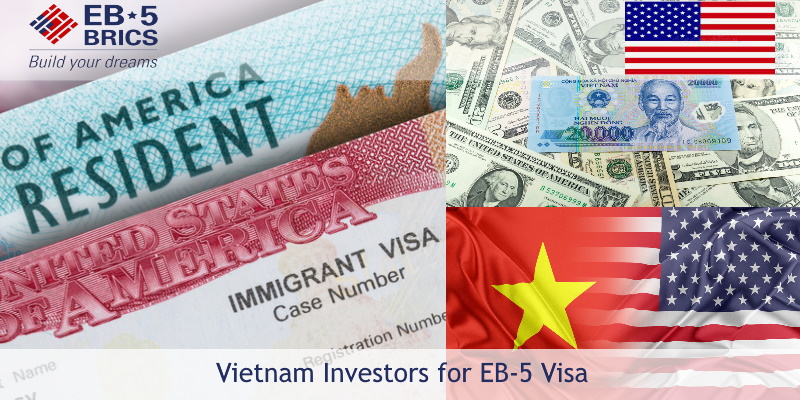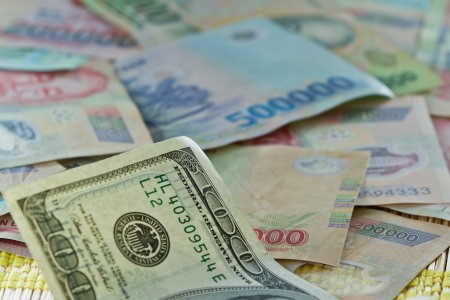 The EB-5 Visa for Vietnam investors is an immigrant investor visa that enables application for permanent residence (green card). Permanent residence (green card) permits indefinite stay in the US for the Vietnam investor and his/her spouse and minor children. The EB5 Visa for Vietnam investors requires a minimum investment that generates 10 full-time American employees.
The EB-5 Visa for Vietnam investors is an immigrant investor visa that enables application for permanent residence (green card). Permanent residence (green card) permits indefinite stay in the US for the Vietnam investor and his/her spouse and minor children. The EB5 Visa for Vietnam investors requires a minimum investment that generates 10 full-time American employees.
Vietnam ranks 1st among the top countries with the most EB5 Visas issued in fiscal year 2024 (51.89% of the total) according to the January 2024 data from the U.S. Department of State. The EB5 Visa allows Vietnamese investors to send their children to US universities and widen their investment prospects. There are currently no delays in the application and processing of EB-5 Visa for Vietnam investors.
EB5 BRICS has helped Vietnam investors achieve US Permanent Residency through investment immigration since 2014. We are here to guide and support you through every step of the EB-5 Visa investment and immigration process. Contact our team to get personalized advice on starting USA investment immigration for you and your family.
Table of Contents
What is EB-5 Visa for Vietnam Investors?
The EB-5 Visa for Vietnam investors is an immigration visa that enables Vietnamese investors to apply for permanent residence (green card) in the United States. Permanent residence (green card) grants Vietnamese investors and their spouses and minor children a permanent stay in the U.S. The EB5 Visa for Vietnam investors requires a minimum investment to generate at least 10 full-time American employees.
What are the Benefits of EB-5 Visa for Vietnam Investors?
The EB-5 Visa benefits Vietnamese investors, their spouses, and minor children through the following.
- Green card and U.S. citizenship. The cities of Hanoi and Ho Chi Minh make up the majority of the Vietnamese investors for EB-5 Visa. Ho Chi Minh makes up about 80% of the total Vietnam investors for EB5 Visa. The heavy migration of Vietnamese from Ho Chi Minh to the United States in the late 1970s resulted in numerous Vietnam-born U.S. immigrants. Vietnamese investors with immigrant relatives are looking to relocate to the U.S. to be with their families.
- Education in the U.S. Vietnamese investors want to raise their children in the US. Their children can get a U.S. education and avoid high education costs from private international schools in Vietnam.
- As a permanent resident, your unmarried children under 21 years can do the following.
- Study in some of the best institutions in the world without facing restrictions imposed on foreign students.
- Pay 150% to 300% lower tuition fees as compared to foreign students.
- Enjoy more funding and scholarship options as compared to foreign students.
- Study as a day scholar and avoid long separation from family just to obtain a quality education.
- Explore job opportunities without worrying about issues like work permits, sponsorship, processing delays, expiry of visa, or restrictions on job mobility.
- As a permanent resident, your unmarried children under 21 years can do the following.
- Wider investment options. Vietnam investors with EB5 Visa can maintain lawful status out of Vietnam while transferring business profits from their companies in Vietnam to more secure U.S. asset holdings.
- Vietnamese investors enjoy greater international mobility through the visa-free travel privileges available to US green cardholders. Vietnamese investors with EB-5 Visa have complete freedom to travel and reside anywhere within the US.
What are the Risks of EB-5 Visa for Vietnam Investors?
These are the challenges that Vietnamese investors for EB-5 Visa face during the application process.
- Currency limitations. Vietnam’s legislation regulates the export of Vietnamese currency overseas. Vietnamese investors for EB5 Visa face difficulties in transferring their funds to the US. Vietnam investors commonly use credit institutions to transfer funds to their EB5 investments. Vietnamese investors have to provide proof of each deposit to the credit institution for their EB-5 petition. The credit institution needs to give an affidavit showing the trace of funds from the Vietnam investor to the US EB5 investment.
- Sources of funds. Not all qualified sources of EB-5 funds are available to Vietnam investors. The tax system in Vietnam limits Vietnamese investors to use their income as an EB5 investment fund. The gifting of land or property is common in Vietnam. Vietnamese investors have to prove how the property gifted to them was acquired by the original owner.
- Immigration challenges. An EB5 investment does not automatically result in a green card. The Vietnamese investor has to meet all the requirements of the EB-5 Visa to be eligible for a green card application.
How Long Does it Take to Process an EB 5 Visa for Vietnam Investors?
The status of EB5 Visa for Vietnam investors is “current” according to the Visa Bulletin from the U.S. Department of State (DOS). “Current” status in the visa bulletin means that there is no backlog in the EB-5 Visa for Vietnamese investors.
The processing time for the Immigrant Petition by Standalone Investor (Form I-526) for an EB5 Visa for Vietnam investors is between 29.5 to 61 months. The Immigrant Petition by Standalone Investor (Form I-526) is submitted to the United States Citizenship and Immigration Services (USCIS). Form I-526 is the initial step to filing an EB-5 Visa for Vietnamese investors.
See Processing Times for Vietnam
Here is a step-by-step process for an EB-5 Visa application for Vietnam Investors.
- Pick an Investment advisor & Immigration attorney.
- Find an EB-5 Project that meets the EB-5 program requirements.
- Investment of Capital & Filing of I-526 petition. (Prior to filing for an EB-5 visa at a US Embassy or Consulate outside the United States, the Form I-526 petition should first be approved by the USCIS.)
- Apply for Adjustment of status (I-485 application) and DS 260 form.
- 2-Year conditional Green card.
- Permanent residency & I-829 petition.
Learn more about: Vietnam – EB 5 Visa Process and Steps involved
The EB-5 U.S. Immigrant Investor Visa Program is available to residents of Vietnam.
What are the Requirements for an EB-5 Visa for Vietnam Investors?
 The following are required to be eligible for the EB-5 Visa for Vietnam investors.
The following are required to be eligible for the EB-5 Visa for Vietnam investors.
- Investment amount. The “at risk” investment for the EB5 Visa for Vietnamese investors can be any of these two.
- The minimum investment is $800,000 (₫18,936,000,000 Vietnamese Dong) for a Targeted Employment Area (region with high unemployment rates and rural areas).
- The investment is $1,050,000 (₫24,858,500,000 Vietnamese Dong) for a non-Targeted Employment Area.
- Source of funds. Vietnam investors can use any of the following to invest.
- Loans from a financial institution or from an individual
- Salaries/wages
- Gifts from an individual
- Inheritance
- Business profits
- Job creation. The EB5 Visa for Vietnamese investors requires the creation of 10 full-time American employees.
The financial criteria for the EB-5 Visa for Vietnamese investors are the following.
- Net worth of $1,050,000 (₫24,858,500,000 Vietnamese Dong) for an individual or married couple; or
- Minimum of $200,000 (₫4,734,000,000 Vietnamese Dong) in individual income in each of the 2 previous years; or
- Minimum of $300,000 (₫7,101,000,000 Vietnamese Dong) in joint income in each of the 2 previous years; and
- Comparable level of future income and assets
Our complete guide on EB5 Qualification has all the information you will need to file your EB-5 petition.
What is the Age Requirement for a Vietnamese Investor to Get EB-5 Visa?
There’s no age limit. The meaning of this simply is any Vietnamese investor qualifies to be an EB-5 investor. However, since a minor probably does not have the assets or income to be eligible as an EB-5 investor on his own, the parents or some other guardian giving him/her the investment amount requires showing the necessary documents to prove the source of funds. Occasionally, a Vietnamese investor pursuing an EB-5 visa will be unable to get specific documentation. In such instances, the applicant may file a declaration giving an explanation as to why they are unable to supply the needed documentation.
The only time age matters is if the parent is applying and children are also part of the application as derivatives. They must be under the age of 21 to be included in a parent’s application.
EB 5 Visa for Vietnamese Investors
Despite the successful history of foreign investment in Vietnam, recent prospects for US Green Card Investment have looked slightly less positive. According to the State Department: “International investors have voiced concerns that the investment climate has deteriorated. Problems include corruption and weak legal infrastructure, financial instability, inadequate training, and education systems, and conflicting and detrimental bureaucratic decision-making.” Despite the overall performance of the Vietnamese economy, which grew at a stable pace in 2014, economic news out of Vietnam over the past few years has included bank runs, credit panics, arrests of high profile businessmen, continued reports of corruption, and questions about the overall stability of the country.
This news has led not only to a reduction of foreign investment but has also caused many Vietnamese to consider seeking permanent residence in another country—in many cases, the United States.
Source: http://www.insidecounsel.com/2015/04/02/investments-come-full-circle-the-us-vietnam-and-eb
EB-5 Visa Statistics for Investors from Vietnam
In FY 2024, 983 EB-5 Visas were issued to Vietnamese investors
Vietnam is the top country with the most EB-5 Visa issuances through consular processing for fiscal year (FY) 2024. A total of 983 EB 5 Visas (51.98% of the total) were issued to Vietnamese investors for FY 2024 according to the U.S. Department of State (DOS).
Vietnam is the top country with the most EB-5 Visa issuances through consular processing for fiscal year (FY) 2024. A total of 983 EB 5 Visas (51.98% of the total) were issued to Vietnamese investors for FY 2024 according to the U.S. Department of State (DOS).
How Much Does an EB-5 Visa Cost for Vietnam Investors?
 These are the costs of an EB-5 Visa for Vietnam investors.
These are the costs of an EB-5 Visa for Vietnam investors.
- EB-5 investment
- $800,000 (₫18,936,000,000 Vietnamese Dong) for a Targeted Employment Area
- $1,050,000 (₫24,858,500,000 Vietnamese Dong) for a non-Targeted Employment Area
- Form I-526- $3,675 (₫86,987,250 Vietnamese Dong)
- Application to Register Permanent Residence or Adjust Status (Form I-485)- $1,140 (₫26,983,800 Vietnamese Dong)
- Petition by Investor to Remove Conditions on Permanent Resident Status (Form I-829)- $3,750 (₫88,762,500 Vietnamese Dong)
The U.S. Citizenship and Immigration Services (USCIS) allows 10,000 EB-5 visas a year.
State Bank of Vietnam is the regulatory body that has framework and monetary policy for moving assets and money outside of Vietnam.
We have an EB5 Green Card Cost page for all you need to know about the fees for an EB-5 Visa application.
What is the Priority Date for EB5 Visa for Vietnamese Investors?
The EB-5 Visa for Vietnam investors is “current” as per the Visa Bulletin from the U.S. Department of State (DOS). There is no backlog for the EB5 Visa for Vietnamese investors.
What is the Best Project to Invest in with an EB-5 Visa for Vietnam Investors?
The best EB5 projects for Vietnam investors include real estate and hotel construction. A real estate EB-5 project has a readily understandable exit strategy even for new Vietnam investors. A hotel construction EB5 project generates significant gains for repayment of investment. EB5 Projects are the businesses invested in by Vietnam investors for the EB5 Visa.
What Does the Future Hold for EB-5 Investors from Vietnam?
The “current” status of the EB5 Visa for Vietnamese investors allows them to obtain their immigrant status faster compared to other nationalities like Indians and Chinese. This “current” status holds a high potential for the growth of Vietnamese investment in EB5 projects.
What are the Differences Between EB-5 Visa and E-2 Visa for Vietnam Investors?
Both the EB5 Visa and the E-2 Visa are immigrant programs for foreign investors. The E2 Visa allows a citizen of a U.S. treaty country to invest in a new or existing U.S. business. A treaty country maintains a treaty of commerce and navigation with the United States. Vietnam is a non-treaty country and does not qualify for an E2 Visa.
These are the features of the EB5 Visa vs E2 Visa.
EB-5 Visa
- No nationality requirement. Vietnamese investors can apply for an EB5 Visa.
- A minimum investment of $800,000 (₫18,936,000,000 Vietnamese Dong) in a new firm located in a targeted employment area.
- 10 full-time jobs created for qualified US citizens in the new business entity.
E2 Visa
- Citizen of a nation with whom the United States has a treaty of trade and navigation. Vietnam investors cannot apply for E-2 Visa.
- Substantial capital investment, or be in the process of investing substantial capital, in a legitimate enterprise in the United States.
- No requirements for a minimum number of jobs created.
What is a Targeted Employment Area?
A targeted employment area (TEA) is a region in the United States where the threshold for investment for a Vietnam investor to be eligible for the EB-5 Visa is $800,000 (₫18,936,000,000 Vietnamese Dong). The two kinds of targeted employment areas are high unemployment areas and rural areas.
What Other Countries can Invest in the EB-5 Visa Program?
About 80% of EB5 investors come from China, South Korea, Taiwan, and the United Kingdom according to Investment Migration Insider. Below are the top countries that apply for the EB-5 Visa.
- Mexico EB-5
- India EB-5
- Taiwan EB-5
- Brazil EB-5
- Nigeria EB-5
- The United Kingdom EB-5
- China Investors EB-5
Is USA a Good Foreign Market to Invest in for Vietnam Citizens?
Yes, Vietnamese investors are particularly drawn to regional centers under the EB-5 Visa program. A regional center is a public or private company that serves as the fund manager or sponsor of an EB-5 project.
Is EB-5 Visa Popular to Vietnam Investors?
Yes, Vietnamese investors ranked third in the top nationalities that were issued EB5 Visas in 2019. Vietnamese investors want to relocate to the US to be with their immigrant relations. Sending their children to US universities and expanding their businesses to the US are additional benefits of the EB5 Visa for Vietnam investors.
Can EB-5 Visa Attorney Speed Up the Process of EB-5 Visa?
Yes, an EB5 Visa attorney (lawyer) guides the Vietnamese investor to speed up the processing of the EB-5 Visa. Incomplete documentation and errors during application are common causes of delays in the EB5 process. These delays in the application can be prevented by hiring an EB5 Visa Lawyer.
Is Obtaining an EB-5 Easy for Vietnam Investors?
There is no backlog in the visa bulletin for EB-5 Visa for Vietnamese investors. Vietnam investors can get their EB-5 Visa faster than applicants from China and India who are experiencing backlogs.
Can a Vietnam Investor Borrow Money for EB-5 Visa?
Yes, Vietnamese investors can borrow money for their EB5 Visa petition. The borrowed money has to be backed up by assets and the collateral cannot be the same EB-5 business. We have a complete guide on EB 5 Funding Requirements for all you need to know about EB-5 funds.
Vietnam, EB 5 Visa Consultant
EB5 BRICS can help you navigate EB-5 U.S. Immigrant Investor Green Card Program through our presence in Vietnam in conjunction with our U.S. Legal Partner. Our team speaks Vietnamese and English.
Schedule an Appointment with Vivek Tandon Esq., US Lawyer and an Investment banker to go through your specific situation.
See more facts and information about other Neighboring Countries: Malaysia, Bangladesh
EB5 BRICS
Ho Chi Minh City, Saigon Tower
16th Floor, Saigon Tower
29 Le Duan sreet, District 1, Ho Chi Minh City
E-mail: info@eb5brics.com

Vietnam Investors for EB-5 Visa Program FAQ
How many EB 5 visas does the US government issue for Vietnam each year?
Currently, there is an annual limit of 10,000 such visas with a per country limit of about 700 visas; thus, there is a limit of 700 EB5 visas per year issued to Vietnamese. These types of visas are increasingly becoming popular with wealthy foreign citizens who want to move to the US.
Can an international student from Vietnam with an F-1 visa apply for EB5 visa?
An EB-5 is certainly available for F-1 visa students from Vietnam who are in the US. In fact, EB 5 is the preferred path for students and professionals in the US to gain permanent residency allowing them to work and live anywhere in the US without requiring any employer sponsorship.
Can someone from Vietnam still apply for EB 5 in 2023?
Yes, Vietnamese can apply for an eb 5 visa this year. EB 5 continues to be available despite attempts to limit immigration into the US. EB 5 has been specifically excluded from any immigration bans and changes.
Can an Vietnamese citizen apply for EB 5 while on H1b?
Yes, H1-B visa is a dual intent visa which means Vietnamese citizens can apply for permanent immigration to the US through EB-5 while they are in the USA on a non immigrant visa such as H-1B.



